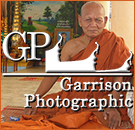|
|
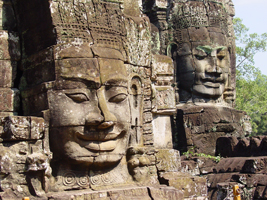 The
Angkor Archaeo-logical Park is home to the magnificent temple
ruins of Angkor, including the legendary
Angkor Wat,
Bayon and
dozens of other ancient ruins
of the, Angkorian-era Khmer Empire.
The Angkor Park is a World Heritage site and encompasses
more than 400 square kilometers just outside
Siem Reap City in northwestern Cambodia. The
Angkor Archaeo-logical Park is home to the magnificent temple
ruins of Angkor, including the legendary
Angkor Wat,
Bayon and
dozens of other ancient ruins
of the, Angkorian-era Khmer Empire.
The Angkor Park is a World Heritage site and encompasses
more than 400 square kilometers just outside
Siem Reap City in northwestern Cambodia.
Siem Reap
City is the gateway to the Angkor Archaeological Park. There
are no hotels within the Park
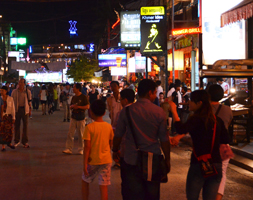 grounds
and most visitors stay in
Siem Reap where almost all of the area's
hotels
and
restaurants are located.
Siem Reap City is just south of the Angkor
Archaeological Park with the Park entrance located only 3km
north of town. With the exception of the
Roluos Group of temples 13km east of Siem Reap, the most
important temple ruin are within 6-25km north of town, the
closest major temple being
Angkor Wat. To arrange your visit to the Angkor
Archaeological Park you will need to decide how long to stay,
purchase an admission pass,
arrange
transportation to the temples,
obtain a guidebook or tour guide and plan out your temple
itinerary. grounds
and most visitors stay in
Siem Reap where almost all of the area's
hotels
and
restaurants are located.
Siem Reap City is just south of the Angkor
Archaeological Park with the Park entrance located only 3km
north of town. With the exception of the
Roluos Group of temples 13km east of Siem Reap, the most
important temple ruin are within 6-25km north of town, the
closest major temple being
Angkor Wat. To arrange your visit to the Angkor
Archaeological Park you will need to decide how long to stay,
purchase an admission pass,
arrange
transportation to the temples,
obtain a guidebook or tour guide and plan out your temple
itinerary. |
------------------------------------------------------------------
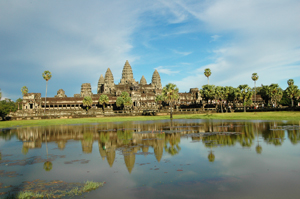 Angkor
Archaeological Park Angkor
Archaeological Park
The temples ruins contained within the Park represent the
remnants of the millennium-old capitals of the old Khmer Empire.
The Khmer people were and are the dominant ethnic group in
Cambodia. The name ‘Angkor’ refers both to the Angkorian-era
Khmer Empire that stretched across much of mainland Southeast
Asia between the 9th and 15th centuries A.D., and also refers to
the capital city of the empire that was centered north of Siem
Reap Cambodia.
Most of the temples within the Park were constructed
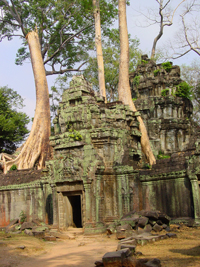 between
the 9th and 12th century A.D. and represent the pinnacle of
ancient Khmer architecture, art and civilization. At its height,
the
Age of
Angkor was a time wealth and power for the Khmer Empire. The
capital city at Angkor was populated by more than a million
people, Khmer kings constructed vast waterworks and grand
temples and the Empire's military, economic and cultural
dominance held sway over the area of
modern Cambodia, as well as much of Thailand, southern
Vietnam and Laos. between
the 9th and 12th century A.D. and represent the pinnacle of
ancient Khmer architecture, art and civilization. At its height,
the
Age of
Angkor was a time wealth and power for the Khmer Empire. The
capital city at Angkor was populated by more than a million
people, Khmer kings constructed vast waterworks and grand
temples and the Empire's military, economic and cultural
dominance held sway over the area of
modern Cambodia, as well as much of Thailand, southern
Vietnam and Laos.
There are dozens of ruins within the
Angkor Archaeological Park, others further afield. The temples
vary in importance, interest and condition and are spread over a
large area, often kilometers apart. In order to get the most of
your visit, it is best to prepare a preliminary itinerary. Your
itinerary should depend largely on the length of your visit and
your level of interest, though some ruins are must-sees. Any
itinerary should include the legendary Angkor Wat and Bayon.
These two temples offer the most spectacular and unique examples
of Angkorian art and architecture. On the road trip to Bayon,
you will also see the South Gate and other minor
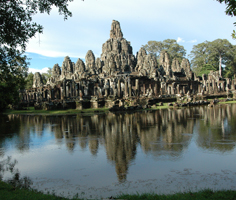 ruins.
As it is within walking distance of Bayon, even the briefest
visit can usually include central Angkor Thom with its
artistically interesting terraces and massive
‘temple-mountains,’ Baphuon and Phimeanakas. ruins.
As it is within walking distance of Bayon, even the briefest
visit can usually include central Angkor Thom with its
artistically interesting terraces and massive
‘temple-mountains,’ Baphuon and Phimeanakas.
As time and interest allows, build the rest of your itinerary
around visiting each type of major ruin – temple mountains such
as Pre Rup, Ta Keo, Bakong and West Mebon; flat, sprawling
monastic complexes such as Ta Prohm, Preah Khan and Banteay
Kdei; and unique monuments such as Neak Pean and Srah Srang. The
Roluos Group, which is comprised the monuments of an early Khmer
capital, lies about 13 km west of Siem Reap. It is a bit out of
the way, but offers some fine examples of early Angkorian art
and should be included in two or three day itineraries. Of
special note is the artistically exquisite but more even distant
temple, Banteay Srey. If there is any way of squeezing it into
your itinerary, it is well worth it.
------------------------------------------------------------------
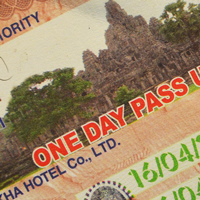 Admission
and Admission
and
How Long to Stay
(Back to top)
You must possess an admission pass
(an 'Angkor Pass') to visit the temples and sites in the
Angkor Archaeological Park. Passes may be purchased at
the main entrance on the road to
Angkor Wat. One-day tickets only can be purchased at the
secondary tollgate on airport road entrance near
Angkor Wat and at
Banteay Srey.
Passes are sold in one-day ($20), three-day ($40) and seven-day
($60) blocks. The three day pass is valid for one week, i.e. 3
days to be used within the week, not necessarily consecutively.
The seven day pass is valid for one month, i.e. 7 days to be
used within the month, not necessarily consecutively.
A one-day visit allows you to see
the highlights of the most famous temples but very little more.
Three days is sufficient to visit all of the major temples once,
a few of the minor ones and have a little extra time at your
favorites. Seven days is enough time to really explore some of
your favorite ruins and visit many of the minor structures as
well. One passport-sized photo is require at time of purchase of
three and seven day passes. If you do not have a photo, free
photos are provided at the main entrance, though this can be a
time consuming process at peak entrance hours.
Visiting hours are 5:00AM - 6:00PM.
Angkor Wat closes at 6:00PM,
Banteay Srey closes at 5:00PM and
Kbal Spean at 3:00PM. Always carry your ticket. It will be
checked upon each park entry and at major temples. There is a
significant fine for not possessing a valid ticket inside the
park. A regular admission ticket is not required to visit Phnom
Kulen, Koh Ker or
Beng Melea, but there is a separate entrance fee of $20, $10
and $5, respectively.
------------------------------------------------------------------
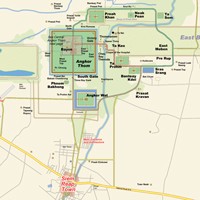 Temple
Itineraries
(Back to top) Temple
Itineraries
(Back to top)
There are dozens of temple ruins in
the
Angkor Archaeological Park spread across more than 400
square km. all in different states of ruin and displaying a
range of artistic and architectural styles. To get the most from
your limited time at the Park you will need to plan a
temple
itinerary. Your personal
temple
itinerary depends largely on how much time you have and your
level of interest, though some temples are ‘must sees.’ See the
suggested itineraries page for much more.
------------------------------------------------------------------
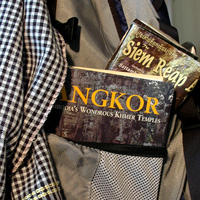 What
to Bring
(Back to top) What
to Bring
(Back to top)
Wear light, airy, covering clothing
to protect yourself from the sun and mosquitoes. The sun can be
intense so bring a hat, sunglasses and perhaps sunscreen.
Consider buying a traditional Khmer scarf (krama) to keep the
sun off your neck. Carry a raincoat during the wet season,
though you will probably only need it in the afternoon. You
should have mosquito repellent for sunrise and sunset hours.
Wear practical shoes for climbing narrow steps and walking on
uneven surfaces. For serious temple explorers, a flashlight,
notebook and compass can come in handy. Books, refreshments,
trinkets, postcards and film are available from small vendors
throughout the temple complex.
------------------------------------------------------------------
Transportation to and around the Temples
(Back to top)
The temples are too far apart to make foot
travel practical (though some hearty visitors are hiking it anyway).
Transportation options include: two-person tuk-tuks (moto-romauk)
average $10-$15/day; car taxis $20-$30/day; motorcycle taxi (motodup)
for $8-$10/day; bicycles for $2-$3/day.
To avoid misunderstandings, negotiate the details of the driver’s
services carefully - exact price, what time you expect the day to begin
and end, availability during lunch and evening hours, limitations on
your itinerary, different prices for small/large circuits, etc.
There are always additional fees for transport to distant temples off
the main circuits (e.g.
Banteay Srey, Phnom Kulen,
Kbal Spean, Koh Ker) Negotiate the fare with your driver.
Bicycling around the temples has become quite popular. If you have the
time to spare, the roads are good, the terrain is flat and the distances
are about right..
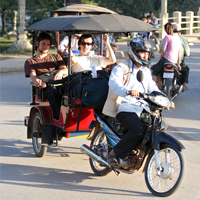 Moto-remorques
(tuk-tuks) Moto-remorques
(tuk-tuks)
Moto-romorques (a.k.a. 'tuk-tuk') are the most common and popular form
of transportation in town - the semi-enclosed trailer offering a
comparatively pleasant ride. Tuk-tuks are omnipresent in Siem Reap. Just
step to the curb and they will find you. For short trips around town,
foreigners are expected to pay 3000R-US$3. Bargain! Full day
rates for transportation to the temples: $10-$15/day. Additional charge
for transport to distant temples.
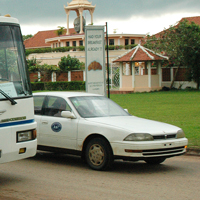 Car
Taxis Car
Taxis
Private car taxis offer a comfortably air-conditioned way to tour the
temples, though they are the most expensive option. Rates: $20-$30 per
day plus additional charges for transportation to distant temples off
the main circuits. Taxis from the airport to town also offer taxi/tour
services to the temples.
Angkor Temple Guides
Experienced guide and driver. One-day
trips to Preah Vihear, with or without guide.
Charles De Gaulle Blvd,
Siem Reap, Cambodia.
Tel: +(855)(0)12-788354
info@angkor-temple-guides.com
www.angkor-temple-guides.com
Angkor Wat Driver & Fixer
Vans, cars, tours, tour guides.
Tel: +(855)(0)92-890005
www.angkorguide.asia/phansy
Cambodia in Comfort
Vans, cars, with driver
Tel: +(855)(0)97-7583336
www.cambodiaincomfort.com
Larryta Express
Car and bus rental.
PP: #99, Sisowath Quay, Phnom
Penh, Cambodia.
Tel: 011-202020
SR: #752, Route #6,
Siem Reap, Cambodia.
Tel: +(855)(0)66-202020
www.larryta.com
Pro Angkor Travel
Tour guides and transportation.
Tel: +(855)(0)86-979295
www.proangkortravel.com
Siem Reap Shuttle
Professionally chauffeured vehicles,
Camry, Mercedes, Lexus, Jeep. Tours and packages. Temple, city,
cultural.
Sivutha Blvd,
Siem Reap, Cambodia.
Tel: +(855)(0)92-555518
+(855)(0)63-767768
www.siemreapshuttle.com
Siem Reap Taxi Driver
Licensed local taxi driver and guides.
English spoken. All sorts of transportation.
Tel: +(855)(0)12-941715
+(855)(0)11-222421
www.siemreaptransport.com
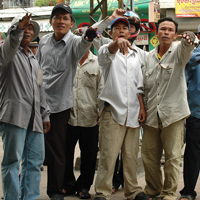 Motorcycle
Taxis
(Back to top) Motorcycle
Taxis
(Back to top)
Motodups are motorcycles on which the passenger rides pillion. Though
motodups are the least expensive motorized option, these days two-person
‘tuk-tuks’ (moto-romorks) are the most popular. Bargain! Motodups should
be a bit more than half as expensive as tuk-tuks. Additional charge for
transport to distant temples. Full day rates for transportation to the
temples: $8-$12/day.
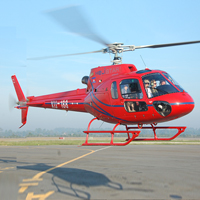 Helicopter
Charter and Rides Helicopter
Charter and Rides
Helistar Cambodia
Helistar Cambodia offers scenic
helicopter tours of the temples beginning at US$90/person for an 8
minute jaunt around Angkor Wat. It isn't a particularly cheap way to
tour but the view is spectacular and memorable. Helistar Cambodia
offers specialized tours, aerial photography and charter services.
Multiple aircraft in service. Located at Siem Reap International
Airport, Domestic Terminal.
Office on National Route #6 (Airport Road), Borey Angkor Arcade, diagonally opposite the Total station, about
1 kilometer west of town center. Walk-in customers welcome.
Tel: +(855)(0)63-966072
+(855)(0)12-449555
www.helistarcambodia.com
Bicycle Rental
(Back to top)
Bicycling have become a popular way to visit the temples. The roads
between the main temples are paved and the distances are about right for
a bicycle touring. Many of the hotels have bicycles for rent. $1-$4/day
depending on the type and quality of the bike.
Green Cycles Travel
Scheduled and custom bicycle tours. Bike rental.
Old Market area,
Siem Reap, Cambodia.
Tel: +(855)(0)12-783377
www.greencyclestravel.com
Green e-bike
Electric bike rental.
Open 7:30AM-7:00PM
Center Market,
Siem Reap, Cambodia.
Tel: +(855)(0)95-700130
+(855)(0)95-700140
www.greene-bike.com
Motorcycle Rental
Tourists are no longer allowed to rent motorcycles or cars, or drive a
vehicle in Siem Reap.
And other ways of
getting around the temples...
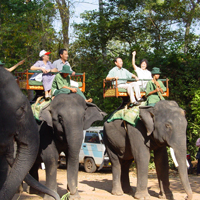 Elephant
Rides Elephant
Rides
During the day, elephants await customers
near Bayon and at the South Gate of Angkor Thom and they
offer rides between those two points. $10 - $15 for a 20 - 30 minute
ride. In the evenings the elephants move from Bayon and are
stationed at the base of Phnom Bakheng, ready to transport
passengers up the hill for sunset ($15 for the ride up and, if you chose
to ride down instead of walk, $10 for the ride down.)
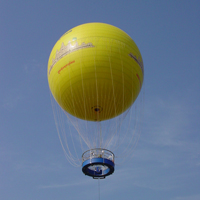 Balloon
Rides Balloon
Rides
Take a tethered helium balloon ride 200 meters straight up for an
amazing aerial view of Angkor Wat, Phnom Bakheng, West Baray and
the surrounding countryside. Bring a camera and binoculars if you have
them. The big, yellow balloon is based about 1 kilometer west from
Angkor Wat on the road from the airport to
Angkor Wat.
------------------------------------------------------------------
Tour Guides
(Back to top)
Whether you use a
guidebook or hire a tour guide, it is essential to have some
sort of guide lest the temples become just so many impressive
piles of rocks. Tour guides are particularly helpful in
explaining the bas-reliefs and history of the temples. Tour
guides can be hired through most hotels and travel agents. Most
guides ask $20 - $25/day.
You can either hire a tour guide and transport separately
(usually through your guesthouse or a travel agent) or book a
group tour through a
travel agent in town such as
Asian Value Travel. Group tours remove many of the hassles,
and depending on your requirements, cost about the same or less
than doing it yourself, especially for the lone traveler. On the
other hand, you do lose some freedom and a bit of the
adventurous atmosphere of Angkor. Some places focus on specialty
tours such as distant temple,
Tonle Sap
and photographer’s tours by
Peace of Angkor Tours and dirt bike/4WD adventure and
cultural tours by
Hidden Cambodia Adventure Tours.
Angkor Temple Guides
San Park is an experienced tour guide and reliable driver,
specializing in Angkor. very reasonably priced. Oneday trips to
Preah Vihear, with or without guide.
Charles De Gaulle Blvd,
Siem Reap, Cambodia.
Tel: +(855)(0)12-788354
+(855)(0)88-8053975
info@angkor-temple-guides.com
www.angkor-temple-guides.com
Angkor Thom and Transportation
Transportation, multi-lingual tour guide, tour packages, city tour
and daily tour at reasonable rates.
Tel: +(855)(0)92-890005
www.angkorthomservices.com
Angkor Tour Guide Service
Angkor park tour packages and tour guides (English Mandarin, French
Japanese), transportation (car, mini-van, transport to distant
temples,) hotel reservations.
Siem Reap, Cambodia.
Tel: +(855)(0)12-631052
+(855)(0)97-7631052
sokchea@guideangkor.com
www.guideangkor.com
Pro Angkor Travel
Tour guides and transportation (car, van, tuk-tuk)
Pub Street, Old Market area
Tel:
+(855)(0)86-979295
www.proangkortravel.com
------------------------------------------------------------------
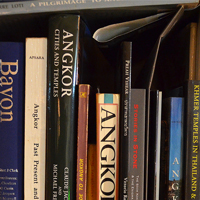 Guides
books
(Back to top) Guides
books
(Back to top)
Guidebooks and other Angkor related books can be purchase at
bookstores and many of the souvenir shops. Bootlegged books are sold
at the Old Market and by vendors throughout the Angkor complex.
Ancient Angkor by Michael
Freeman and Claude Jacques. (Thailand: River Books, 2006)
Beautifully photographed, authoritative guidebook to the temples of
Angkor and the Angkor Archaeological Park. One of the top guidebooks
to the temples. Recommended.
Angkor: Cambodia’s Wondrous Khmer Temples
by Dawn F. Rooney (Odyssey Publications, Hong Kong, 2006, 5th
edition) Popular, complete, accurate. The most complete English
language guidebook available. One of the top guidebooks to the
temples. Recommended.
The Monuments of the Angkor Group
(Les monuments du groupe d'Angkor)
by Maurice Glaize. Classic 1944 guide to the temples written by a
former Conservator of Angkor (1937-1945). Available in English and
French and also online.
www.theangkorguide.com
Other reading...
see the
books page for more Cambodia related books.
Angkor Observed by awn F.
Rooney. (Thailand: Orchid Guides, 2003) A nostalgic picture of the
early days of tourism to Angkor drawn through excerpts from
19th/20th century journals and travelogues.
A Field Guide to Siem Reap Pagodas
by Ray Zepp. (Cambodia: 2000) A knowledgeable, easy-to-read
introduction to Cambodian Buddhism and local pagodas.
The Customs of Cambodia by
Zhou Daguan (Chuo Ta-Kuan). A short but unique and fascinating
eye-witness account of royal and ordinary life in 13th century
Angkor.
A History of Cambodia by
David Chandler. (Bangkok Thailand: White Lotus, 1994) A complete,
scholarly but accessible account of Cambodian history from the dawn
of Funan to the present.
Images of the Gods: Khmer Mythology in Cambodia, Laos & Thailand
by Vittorio Roveda. (Bangkok: River Books, 2005) A sweeping
photographic exposition and historical analysis of ancient Khmer
sculpture reliefs from Angkor and across the region.
Khmer Heritage in the Old Siamese Provinces of Cambodia
by Etienne Aymonier. (Bangkok Thailand: White Lotus, 1999, orig.
1901) Turn of the century report/guide. Locations and temple
descriptions of familiar and remote temples.
Travels in Siam, Cambodia, Laos and Annam
by Henri Mouhot. (Thailand: White Lotus, 2000 reprint, orig. 1864).
|
